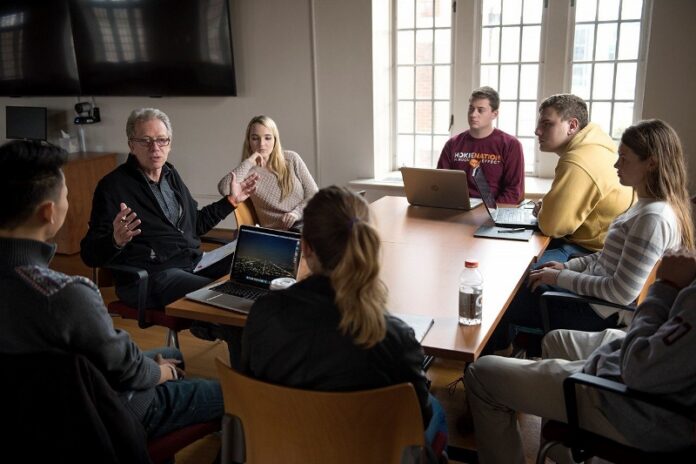
Virginia Tech is launching a center for higher education innovation to chart new ways to prepare students to solve problems and generate new perspectives in today’s complex world.
The Calhoun Center for Higher Education Innovation is one of three interrelated initiatives to benefit from a $20 million gift to the Honors College by Virginia Tech alumnus David Calhoun, a senior managing director for Blackstone and the former CEO of Nielsen.
The gift will also support the development and implementation of curricula for the Calhoun Honors Discovery Program, a pilot model for collaborative learning within the Honors College that will train graduates for the 21st century’s innovation economy. Of the gift, $15 million is endowed for Discovery Program scholarships.
The Discovery Program’s focus on transdisciplinary learning with an emphasis on solving complex problems and advancing innovation is in keeping with the Virginia Tech’s Beyond Boundaries long-term visioning process and Destination Areas model of collaborating across disciplines.
The Calhoun Center for Higher Education Innovation will partner closely with the Honors College in the development of the Discovery Program and the connection of the program to a small cohort of academic, industry, and community partners.
The goal of the Calhoun Center is to connect the Calhoun Honors Discovery Program to national best practices for structuring and assessing adaptive, cross-cutting curricula. An outcome will be a set of blueprints that can be applied by forward-looking educators inside and outside Virginia Tech.
The center will initially focus its research on five interconnected themes that are also key components of the Discovery Program:
- Continuous collaborative development across academia, industry, and professional organizations of learning outcomes, assessment structures, and training experiences for a 21st century dynamic economy
- Cross-cutting conceptual frameworks that facilitate the integration of knowledge across disciplines and promote an interconnected liberal education
- Transdisciplinary problem solving and reflection as key components of 21st century education
- Machine-assisted adaptive learning across the lifespan
- Dynamic curricula that integrate disciplinary preparation, cross-cutting conceptual frameworks, and transdisciplinary problem solving
All five themes are already signature strengths of Virginia Tech, and are being researched by multiple groups across the university. The Calhoun Center plans to partner closely with such groups to connect their work to the Discovery Program’s work. The center will also facilitate the external partnerships of the Discovery Program. Calhoun has agreed to chair the center’s advisory board of key leaders from industry, academia, and professional organizations that are already active in programs compatible with the center’s and the program’s goals. John Tracy, retired chief technology officer of Boeing, has agreed to serve as senior advisor to the center.
The center will be headed by Virginia Tech faculty member Thanassis Rikakis. He, along with Honors College Dean Paul Knox, other university leaders, and faculty members developed the original concept for and recently launched the Discovery Program pilot. Rikakis also co-chairs the Discovery Program’s design team.
“This project is a tremendous opportunity to connect a number of emerging innovation trends in higher education in a comprehensive manner,” Rikakis said. “The Honors College is an ideal location for this type of pilot project, but our goal is to develop new techniques that can be extended throughout Virginia Tech and serve as a model for other universities nationwide.”

Calhoun, who earned his bachelor’s in accounting in 1979, said his gift was inspired by a desire to help more students afford college and to help Virginia Tech find innovative new ways to prepare tomorrow’s leaders to solve complex problems.
“The more I learned about this program from leaders like Thanassis Rikakis and Paul Knox, the more I wanted to help support it,” Calhoun said. “I consider this to be an experiment, and it’s going to be an enriching experience for all the students who enter it. The students will be true co-developers of the program. In some ways, we’re teaching discovery. That, for me, is very exciting.”
The first honors students to participate will have majors in four colleges that are collaborating closely with honors on the project: the College of Architecture and Urban Studies, Pamplin College of Business, College of Engineering, and College of Science.
“Honors College students are high achievers who have the skills to learn,” said Lara Khansa, associate professor of business information technology and associate dean for undergraduate programs, who is a member of the transdisciplinary team that is working to design the program. “Our goal is to teach them to be open to risk, open to learning rather than gratification, open to exploration. Even if they don’t come with these skills, they’ll be able to acquire them early in the program. We know they are very competitive and capable. We’ll also teach them how to have agency — how to be strong in a certain discipline but also have distributed intelligence.”
Another member of the team is Mark Embree, professor of mathematics and program leader of the Computational Modeling and Data Analytics Program.
“Virginia Tech is reimagining how we educate students in a creative and deep way,” said Embree, who is an honors graduate of Virginia Tech himself. “We keep the disciplinary depth — we treasure that — but some students are ready for more. We want to teach them to work in interdisciplinary teams, to share their expertise while they learn from others, and to develop a hunger for tackling hard problems that exceed any domain.”
Design of the Discovery Program pilot initiative began more than a year ago, first with a working group that outlined a vision for the project. The project recently moved into a new phase, with a new team formed to design the initiative in detail.
“An initiative this ambitious would not be possible without extensive collaboration across our university,” said Knox, the Honors College dean. “I appreciate all the partners who are helping make this possible. That includes Dave Calhoun. His generosity makes it possible for us to launch this project at a much larger scale than we could ever have done without him.”
Albert Raboteau

